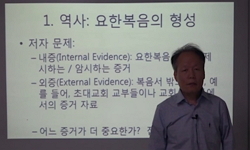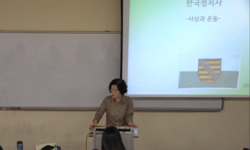After 2-century of mission history, development of churches are stagnating and negative evaluations on Christianity is added. At this point of time, it is necessary to assess whether schools that were established for evangelization are properly doing ...
http://chineseinput.net/에서 pinyin(병음)방식으로 중국어를 변환할 수 있습니다.
변환된 중국어를 복사하여 사용하시면 됩니다.
- 中文 을 입력하시려면 zhongwen을 입력하시고 space를누르시면됩니다.
- 北京 을 입력하시려면 beijing을 입력하시고 space를 누르시면 됩니다.
영남신학대학교의 정체성과 신학교육 = Identity and Theological Education of Youngnam Theological University and Seminary
한글로보기https://www.riss.kr/link?id=A100228789
- 저자
- 발행기관
- 학술지명
- 권호사항
-
발행연도
2014
-
작성언어
Korean
-
주제어
예수의 복음 ; 바울의 복음 ; 연속성 ; 비연속성 ; 상관성 ; the Gospel of Jesus ; the Gospel of Paul ; Continuity ; Discontinuity ; Correlation
-
자료형태
학술저널
- 발행기관 URL
-
수록면
9-30(22쪽)
- 제공처
-
0
상세조회 -
0
다운로드
부가정보
다국어 초록 (Multilingual Abstract)
The word college derived from ‘collegium,’ a form of dormitory in medieval age. This illustrates that university study was in the form of communitarian lives of teachers and students in dormitory. Universitas was made as students and teachers formed association following guild system that was made for interests of merchants in medieval era. Form of Seminaries has its root in medieval times. Originally, the word ‘seminary’ derives from a Latin word with meaning of ‘small patch of land selected to grow saplings.’ In Renaissance this was developed as ‘place for training to guard special traditions and further the meaning was settled as ‘place for theological education for clergies with special mission’ in modern era.
Seminaries were influenced from churches, monasteries, and universities. Their ministerial formation was influenced from church tradition while spiritual formation and academic formation were influenced from monastery tradition and university tradition respectively. In early times, Martin Luther divided theology education into oratio, meditatio and tentatio and exerted only the combination of these three can lead to holistic theology education. Likewise, today’s seminaries can make a firm theoretical education when they do not lose the tradition of monasteries, churches and universities and keep them balanced.
Based on such educational tradition seminaries ought consider conditions of today’s Korean churches and develop new curricula. Since there are overloaded pastors who are more than demands one ought to develop new ministerial model and reflect it to theoretical education as alternative. New interests in recent years such as “tent making ministry” or “business and ministry” will also have to be led to new phase of ministry on well-established theology. Also, leaderships that consider unified Korean churches will also have to be cultivated.
After 2-century of mission history, development of churches are stagnating and negative evaluations on Christianity is added. At this point of time, it is necessary to assess whether schools that were established for evangelization are properly doing their works. Especially, since seminaries are education organization with special purpose, one ought to assess if curricula are running under the initial purpose. Based on this, present paper will attempt to find the general theory of Christian colleges and seminaries. Evaluation and analysis will be made from YTUS under denomination of Presbyterian Church of Korea(Tonghap)
The word college derived from ‘collegium,’ a form of dormitory in medieval age. This illustrates that university study was in the form of communitarian lives of teachers and students in dormitory. Universitas was made as students and teachers formed association following guild system that was made for interests of merchants in medieval era. Form of Seminaries has its root in medieval times. Originally, the word ‘seminary’ derives from a Latin word with meaning of ‘small patch of land selected to grow saplings.’ In Renaissance this was developed as ‘place for training to guard special traditions and further the meaning was settled as ‘place for theological education for clergies with special mission’ in modern era.
Seminaries were influenced from churches, monasteries, and universities. Their ministerial formation was influenced from church tradition while spiritual formation and academic formation were influenced from monastery tradition and university tradition respectively. In early times, Martin Luther divided theology education into oratio, meditatio and tentatio and exerted only the combination of these three can lead to holistic theology education. Likewise, today’s seminaries can make a firm theoretical education when they do not lose the tradition of monasteries, churches and universities and keep them balanced.
Based on such educational tradition seminaries ought consider conditions of today’s Korean churches and develop new curricula. Since there are overloaded pastors who are more than demands one ought to develop new ministerial model and reflect it to theoretical education as alternative. New interests in recent years such as “tent making ministry” or “business and ministry” will also have to be led to new phase of ministry on well-established theology. Also, leaderships that consider unified Korean churches will also have to be cultivated.
목차 (Table of Contents)
- Ⅰ. 들어가는 말
- Ⅱ. 대학교와 신대원의 정체성
- Ⅲ. 영남신학대학교의 정체성과 교육
- Ⅳ. 영남신학대학원의 정체성과 교육
- Ⅴ. 나가는 말
- Ⅰ. 들어가는 말
- Ⅱ. 대학교와 신대원의 정체성
- Ⅲ. 영남신학대학교의 정체성과 교육
- Ⅳ. 영남신학대학원의 정체성과 교육
- Ⅴ. 나가는 말
동일학술지(권/호) 다른 논문
-
영남신학대학교의 특성화 방향과 미래 인재상에 기초한 교육방향과 목적 및 교과과정에 대한 연구
- 영남신학대학교
- 최태영(Choi, Tae-Young)
- 2014
-
도전과 응전(Challenge and Response)
- 영남신학대학교
- 박중수(Jung-Su Pak)
- 2014
-
- 영남신학대학교
- 김규식(Kyu-Sik Kim)
- 2014
-
영남신학대학교 사회복지학과의 문화복지 중심 특성화에 관한 연구
- 영남신학대학교
- 조운희(Woon-Hee Cho)
- 2014




 DBpia
DBpia






